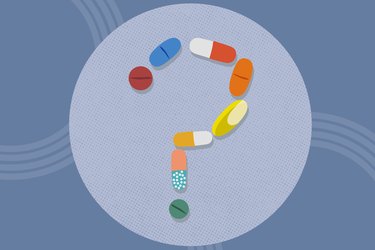
Your cereal and orange juice may be spiked. Well, with vitamins and minerals, that is. Plenty of everyday processed foods are fortified with nutrients the typical American doesn't get enough of, including fiber, iron and vitamin D.
But there are also supplements you can take to get those nutrients — so which source is better? Is there even a difference between eating fortified food and taking a multivitamin or other supplement?
Video of the Day
Video of the Day
For our Ask the RDs series, we asked readers to send us their biggest nutrition questions and then posed the 12 most common to a panel of registered dietitians. Here's what the experts had to say about eating fortified foods vs. taking supplements.
Are Fortified Foods Better Than Supplements?
"Eating fortified food is not the same as taking a supplement because a fortified food could provide you with other things, as well. For example, if you take a fiber supplement, then you're just getting fiber. If you eat a cereal that's fortified with fiber, then you're perhaps also getting B vitamins and iron and other nutrients within that food.
I'm a fan of fortified foods. Almond milk, cold cereals, yogurts and orange juice are all foods that may be fortified. Most commonly, calcium, fiber and vitamin D are added to foods because they're lacking in our diet, so it makes the food more valuable nutrition-wise. I think very often fortified foods are overlooked as excellent sources of nutrients."
"I'm all in favor of fortification. Before fortified foods came out, there were a ton of birth defects related to lack of folic acid. When the fortification program went into effect, those numbers dropped.
I think fortification is a huge benefit. You can get a ton of nutrients in fortified cereal or fortified bread and pasta as well. It's not the same as taking a supplement because they provide a real breadth of nutrients, like iron, zinc and folic acid."
"You could pretty much put fortified foods on par with supplements. If you take a supplement, you're supplementing your body with nutrients that the foods you're eating don't have. Having a fortified food is the same thing — this food in its natural state didn't necessarily contain those particular nutrients, so they're added.
The exception to this is that certain foods are better absorbed when they're combined. The fat-soluble vitamins — A, D, E and K — need fat to be absorbed by your body. So if you're eating something fortified with these vitamins, you definitely want to have them with some fat.
If you're drinking milk fortified with vitamin D, for example, it's a good idea to choose one that has some fat in it, to help your body better take in the nutrient."
"Fortified foods are going to be better than supplements because when you're eating them, you're getting nutrients but also food that's keeping you full and satiated.
However, there's also a place for supplements. There are a lot of cracks in the American diet and on the average American's plate. It's rare that people are getting all the nutrients they need, and multivitamins can help fill the gaps.
But the rule is to first get your nutrients from food, then you could have a multivitamin as a kind of 'health insurance.'"
The Takeaway
Fortified foods are generally superior to supplements because they provide a larger variety of vitamins and other nutrients and contribute to your daily calorie needs (and to feeling satiated). Fortified foods are safe and can be a great source of vitamins and nutrients that you may not be getting enough of otherwise, such as fiber, calcium and vitamin D.
Confused about nutrition? Get answers to more common questions in our Ask the RDs series.



